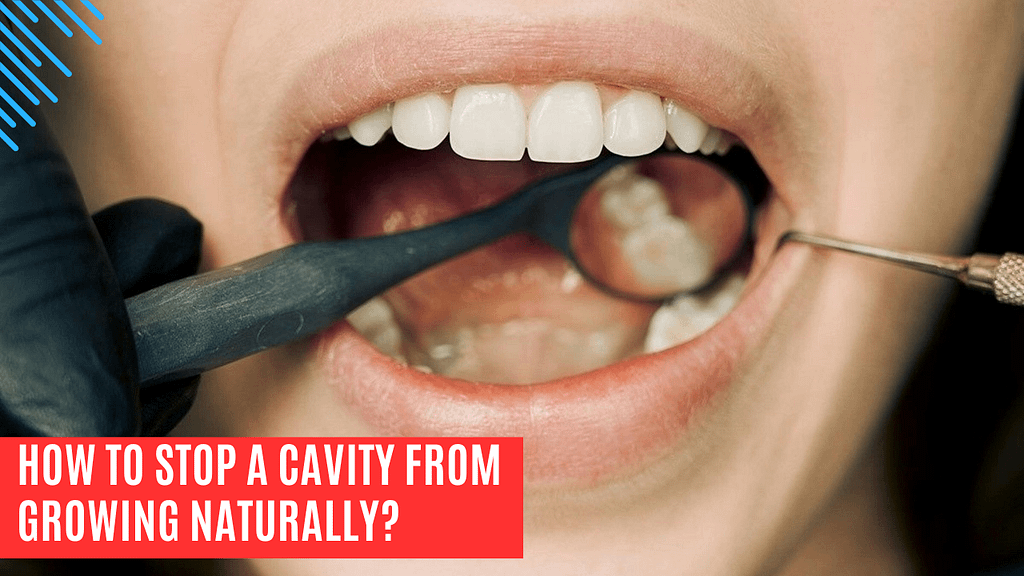Are you suffering from dental cavities and looking for ways how to stop a cavity from growing? Fear not—we’ve got you covered; there is no need to worry much about dental cavities as their progression can be halted.
Oral directions will provide thorough guidance on dental cavities, their stages, and ways to stop their progression through professional treatment, home care, and lifestyle modifications to enjoy sound oral health.
Read More: How to Stop a Cavity from Worsening?
What is a Dental Cavity?
A cavity is also known as tooth decay, which appears as holes in your teeth and gums and causes pain. Most individuals take it as teeth discoloration as dark brown or black spots appear on your teeth.
Cavities develop due to poor dental hygiene and eating habits, which allow bacterial growth to develop a sticky surface on the enamel known as plaque. Bacterial metabolites affect tooth enamel and cause tiny holes. If left untreated, it can result in serious toothache, an infection, or tooth loss. If you are also looking foe ways to prevent cavity from hurting, incorporate the following oral directions in your dental regime.
What Makes Cavities Grow?
It’s essential to know about the stages of cavities before delving into ways to stop the growth of dental cavities. These are different stages of cavities. In some cases, people consider dark spots on teeth as cavities. Here are some stages of cavities:
- Demineralization
This stage is characterized by the white spot as the enamel erodes due to losing minerals.
Plaque develops on the teeth’ surface due to the constant accumulation of food residues and harmful bacteria.
- Enamel Decay
Enamel was destroyed due to too much acid production by harmful oral bacteria. This enamel degradation caused microscopic pits and holes on the enamel’s surface. And white spots become visible, which later turn into brownish/black spots. There is no pain or discomfort during this stage.
- Dentin Decay
Dentin is the layer beneath the enamel, which will ultimately be damaged due to enamel destruction. As dentin is a softer part of teeth and is a bit more sensitive than enamel, it quickly erodes due to rapid acid production. Teeth become sensitive to beverages and cold and hot food at this point.
- Pulp Damage
The teeth’s pulp, the innermost layer, will be harmed if decay penetrates that layer. As the pulp contains most nerve endings and has a rich blood supply, it is vulnerable to infections such as pulpitis, which is the inflammation of the pulp.
How To Stop a Cavity from Growing with Professional Treatments?
Dental cavities are the areas on teeth enamel that get damaged and form small pits. These are also known as caries. The primary cause of cavities is tooth decay, which is caused due to enamel destruction. Many people look for the ways how they can stop cavities from getting worse.
Teeth enamel breaks down due to the overproduction of acids, which causes microbes in the oral cavity; enamel cavities develop in the teeth due to this damage. There are professional treatment options available to halt the growth of dental cavities. These options are as follows:
1. Fluoride Treatments
Fluoride treatments are one of the most effective ways to treat problems related to tooth decay and cavities. It helps to strengthen the enamel and also promotes remineralization in the teeth. Due to remineralization, the chances of tooth decay and cavities have reduced significantly.
It repairs the damaged enamel due to acids and increases the enamel resistance to the acids produced by oral bacteria. According to studies, it’s been stated that by fluoride treatment, the risk of developing cavities in children and adults decreases by up to 30%.
Fluoride treatments are available in various forms, ranging from topical gel varnishes to fluoride supplements. If you are looking for a way to heal cavity without fillings, this is the right option.
2. Dental sealants
Dental sealants are beneficial for sealing the tooth’s chewing surface, which is more vulnerable to cavities. They create a physical barrier between teeth and food; in this way, bacteria and food residues don’t come in direct contact with teeth, preventing tooth decay and enamel deterioration.
The procedure is simple yet effective and doesn’t require numerous dental appointments.
- Dentists first examine your mouth for cavities and severity of tooth decay.
- After cleaning and drying the tooth, an acidic solution is applied to the enamel to roughen it. The sealant adheres better to the tooth surface due to the application of the acidic solution.
- Then, the sealant is coated on the tooth, and with the help of curing light, this sealant is hardened.
- It’s a quick and painless procedure.
3. Restorative Treatments
Restorative treatments are done to restore the tooth’s optimal functioning and halt the growth of cavities.
The type of treatment varies depending on the severity of cavities and tooth decay. The following are the main restorative options:
- Fillings: Fillings are done to restore the teeth’ structure and to prevent further decay. It has several types, including amalgam, gold, and composite fillings.
- Inlays and Onlays: These are preferable for larger cavities that simple fillings treat cant
- Crowns: A shaped cap known as the crown is used to restore worn, decayed teeth. They provide solid protection against further decay and cavities.
4. Root Canal Therapy
Simple fillings are ineffective when the cavities are left untreated, and tooth decay reaches the inner layers (dentin, pulp). In this case, root canal treatment is required to restore the teeth and prevent further decay.
- The damaged part of teeth, including caries and cavities, is removed, stopping the infection from spreading to the adjacent tissues.
Read: At What age should a child get a dental X-ray?
How To Stop a Cavity from Progressing at Home?
The growth of cavities can be stopped by taking good care of oral health and practicing oral hygiene. There is no way around that you heal cavities in 2 days. You have to follow dental care routine and visit dentist regularly. Following are the ways and remedies to halt the growth of dental cavities at home:
1. Maintain Oral Hygiene
To stop the cavity from getting worse, it’s essential to maintain good oral health care. Follow these steps:
- Regular brushing, at least twice a day, can prevent the development of cavities. Fluoride toothpastes are effective in stopping further progression of cavities.
- Dentists recommend flossing as it efficiently removes food residues and plaque built up in areas the brush can’t reach.
- Further, it’s advisable to use an antimicrobial mouthwash, which helps to reduce the load of cavity-causing bacteria in the mouth.
2. Stay Hydrated
Drinking plenty of water can reduce the chances of cavities formation. Water helps to maintain saliva flow, as this saliva acts as a neutralizer for acids produced by oral bacteria.
- An adequate amount of water aids in washing away the food residues on which cavity-causing bacteria feed.
- Therefore, by increasing the uptake of water, tooth decay and dental cavities can be prevented.
3. Dietary Changes
Limiting the consumption of sugar and beverages increases the chances of stopping a cavity from spreading tremendously.
- Foods rich in sugars act as fuel for cavity-causing bacteria, thus leading to tooth decay over time.
- Alternatively, foods rich in calcium and phosphate (i.e., dairy products) will enhance remineralization.
- Increasing the intake of dairy products like milk, cheese, and yogurt can prevent cavities.
4. Baking soda
By neutralizing oral acids, baking soda lessens bacterial growth and helps prevent enamel damage. It increases the pH of the oral cavity, thus obstructing the growth of cavity-causing bacteria.
- Combine the baking soda and water to form a paste.
- Gently brush your teeth with this paste.
5. Xylitol Bubble Gum:
Xylitol is a natural sugar alcohol that reduces cavity-causing bacteria and promotes saliva production.
It inhibits the growth of Streptococcus mutans, the primary bacteria responsible for cavities. It stimulates saliva flow, which helps to neutralize acids and wash away food particles and bacteria.
- After meals and snacks, chew xylitol gum for around twenty minutes.
- Swap out sugary snacks for mints or lozenges sweetened with xylitol.
- Look for xylitol-containing mouthwashes and toothpaste.
6. Oil pulling
Oil pulling aids in the prevention of cavities by lowering plaque and gingivitis. Plaque formation is decreased by the oil’s ability to capture and eliminate oral germs.
Additionally, it aids in detoxifying the mouth and reducing the proliferation of bacteria.
- Swish your mouth with oil (coconut, sesame, or sunflower oil) for a few minutes and then spit it out.
- This will help to lessen plaque and dangerous bacteria.
7. Green Tea
Green tea is rich in antioxidants and has antibacterial properties due to a high amount of catechins.
Catechins in green tea have antibacterial properties and can prevent germs’ growth and lessen plaque production.
- Green tea can assist in improving gum health and lower the incidence of cavities when consumed regularly.
- You can use cooled green tea to rinse your mouth after meals. It will help with plaque build-up.
Bottom Line:
A multifaceted approach to stop a cavity from growing should be adopted. Professional treatments can be combined with diligent at home care and lifestyle changes to prevent new tooth cavities from forming.
People could maintain their teeth’s health by learning how tooth holes develop and using comprehensive procedures to stop them.
Cavity prevention and management begins with regular dental visits, informed dietary choices, and proper oral hygiene practices.
Find more information in oral directions about dental health and how to stop a cavity from forming.
FAQs
Can the progression of a cavity be stopped?
Indeed, it is possible to stop a cavity from progressing by maintaining good oral hygiene, using fluoride, and visiting a dentist for early intervention.
Can a cavity be stopped once it starts?
Treatment with proper dental care, such as fluoride treatments or dental sealants, can help detect and treat cavities early.
Can you brush away a forming cavity?
Just mention that a few brushes alone may not get rid of the cavity that is forming, but using fluoride toothpaste alongside maintaining good oral hygiene will slow down the growth of the cavity.
How do you fix a cavity that grows?
Several options are available to fix the growing cavity, such as fillings, root canal therapy and fluoride treatments.

